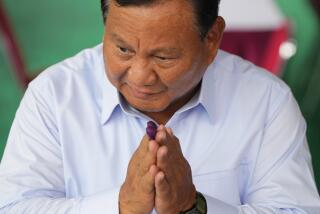Aid, but Monitor, Indonesia
The civilian governments that have ruled Indonesia for three years removed only a little of the power of the often brutal, often corrupt military. Generals run private monopoly businesses and pocket cuts from military contracts.
Last weekend, the nation’s highest legislative body took a big step, recommending that parliament no longer reserve several dozen seats for the army. If implemented, abolition of the reserved seats would be at least a symbolic reduction in the role of the nation’s most important institution.
The 700-member People’s Consultative Assembly (500 parliamentarians and 200 nonelected members) took additional steps to bolster democracy in Indonesia by calling for direct presidential elections and for keeping the world’s largest Muslim country a secular state. Parliament will need to write legislation to enact the constitutional changes on the army seats and direct elections; if it does, the new laws will take effect in two years.
The army has been one of the country’s pillars since it helped expel Dutch colonial rulers soon after World War II. Suharto led the generals who ousted civilian President Sukarno in a 1966 coup; Suharto’s rule ended in 1998, after decades of increasingly corrupt, repressive governance. An elected civilian government took power the next year. In an encouraging development last month, a son of Suharto was sentenced to 15 years in prison for paying two hit men to murder a Supreme Court justice.
Washington began cutting ties between U.S. and Indonesian military forces in 1992 because of governmental repression in Indonesia’s colony of East Timor. In 1999, the United States ended all military links because the army abetted atrocities when the Timorese voted for independence. However, some links have been restored since Sept. 11 and there will be more, because Indonesia could become a haven for Al Qaeda.
Secretary of State Colin L. Powell said during his visit to Indonesia this month that Congress would watch carefully to see whether the Indonesian army punished more soldiers for human rights violations. A State Department survey this year found the armed forces still shooting, torturing and beating civilians, while remaining largely exempt from control by the civilian government of Megawati Sukarnoputri, Sukarno’s daughter.
U.S. funds will pay to create and train a police force, including a counterterrorism unit, that can help track Al Qaeda. Islamic militants have tried to increase their influence in a number of Southeast Asian nations, including Indonesia, though with little success so far. Indonesia’s foreign minister noted this month that “Indonesian Muslims are very moderate.”
U.S. aid can help support a government that fosters Muslim moderation, but that money should not finance military atrocities against dissidents in Indonesian territories such as Aceh and Irian Jaya. Washington should track its money and hold Jakarta accountable.
More to Read
Sign up for Essential California
The most important California stories and recommendations in your inbox every morning.
You may occasionally receive promotional content from the Los Angeles Times.










